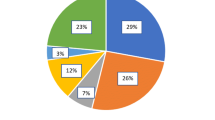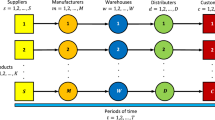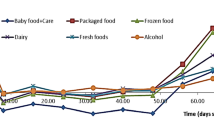Abstract
This paper considers supply chain models with two competitive manufacturers and a common retailer that sells products of both manufacturers under a fuzzy decision environment. The parameters of demand function and manufacturing cost are treated as fuzzy variables. Two manufacturers and one retailer are assumed to pursue three different power balance scenarios: Manufacturer-Stackelberg, Retailer-Stackelberg and Vertical-Nash games. For each case, the optimal solutions of the expected value and two chance-constrained programming models are derived. Finally, numerical examples are provided to illustrate the results of proposed models. It is shown that in fuzzy models, the different scenarios affect the optimal pricing strategies, and the confidence level of the profits for supply chain members affects the optimal solutions.
Similar content being viewed by others
References
Choi, S. C. (1991). Price competition in a channel structure with a common retailer. Marketing Science, 10(4), 271–296.
Choi, S., & Fredj, K. (2013). Price competition and store competition: Store brands vs. national brand. European Journal of Operational Research, 225(1), 166–178.
Farahat, A., & Perakis, G. (2011). On the efficiency of price competition. Operations Research Letters, 39(6), 414–418.
Huang, M., Ip, W. H., Yang, H. M., Wang, X. W., & Lau, H. C. W. (2008). A fuzzy synthetic evaluation embedded tabu search for risk programming of virtual enterprises. International Journal of Production Economics, 116(1), 104–114.
Huang, X. (2009). Review of credibilistic portfolio selection. Fuzzy Optimization and Decision Making, 8(3), 263–281.
Huang, M., Cui, Y., Yang, S. X., & Wang, X. W. (2013). Fourth party logistics routing problem with fuzzy duration time. International Journal of Production Economics, 145(1), 107–116.
Huang, M., Song, M., Lee, L. H., & Ching, W. K. (2013). Analysis for strategy of closed-loop supply chain with dual recycling channel. International Journal of Production Economics, 144(2), 510–520.
Jiang, Z.-Z., Zhang, R., Fan, Z.-P., & Chen, X. (2014). A fuzzy matching model with Hurwicz criteria for one-shot multi-attribute exchanges in E-brokerage. Fuzzy Optimization and Decision Making. doi:10.1007/s10700-014-9189-x.
Lau, H. C. W., Jiang, Z. Z., Ip, W. H., & Wang, D. (2010). A credibility-based fuzzy location model with Hurwicz criteria for the design of distribution systems in B2C e-commerce. Computers & Industrial Engineering, 59(4), 873–886.
Liu, B., & Iwamura, K. (1998a). Chance constrained programming with fuzzy parameters. Fuzzy Sets and Systems, 94(2), 227–237.
Liu, B., & Iwamura, K. (1998b). A note on chance constrained programming with fuzzy coefficients. Fuzzy Sets and Systems, 100(1), 229–233.
Liu, B., & Liu, Y. K. (2002). Expected value of fuzzy variable and fuzzy expected value model. IEEE Transactions on Fuzzy Systems, 10(4), 445–450.
Liu, B. (2007). Uncertainty theory (2nd ed.). Berlin: Springer.
Liu, S., & Xu, Z. (2014). Stackelberg game models between two competitive retailers in fuzzy decision environment. Fuzzy Optimization and Decision Making, 13(1), 33–48.
Nahmias, S. (1978). Fuzzy variables. Fuzzy Sets and Systems, 1(2), 97–110.
Wang, J. C., Wang, A. M., & Wang, Y. Y. (2013). Markup pricing strategies between a dominant retailer and competitive manufacturers. Computers & Industrial Engineering, 64(1), 235–246.
Wei, J., Pang, G., Liu, Y., & Ma, Q. (2013). Pricing decisions of a two-echelon supply chain in fuzzy environment. Discrete Dynamics in Nature and Society, 2013, 1–11.
Wu, X., Zhao, R., & Tang, W. (2014). Uncertain agency models with multi-dimensional incomplete information based on confidence level. Fuzzy Optimization and Decision Making, 13(2), 231–258.
Yang, S. L., & Zhou, Y. W. (2006). Two- echelon supply chain models: Considering duopolistic retailers’ different competitive behaviors. International Journal of Production Economics, 103(1), 104–116.
Yao, Z., Leung, S. C. H., & Lai, K. K. (2008). Manufacturer’s revenue-sharing contract and retail competition. European Journal of Operational Research, 186(2), 637–651.
Zadeh, L. A. (1965). Fuzzy sets. Information and Control, 8(3), 338–353.
Zadeh, L. A. (1978). Fuzzy sets as a basis for a theory of possibility. Fuzzy Sets and Systems, 1(1), 3–28.
Zhao, R., Tang, W., & Yun, H. (2006). Random fuzzy renewal process. European Journal of Operation Research, 169(1), 189–201.
Zhao, J., Tang, W., & Wei, J. (2012). Pricing decision for substitutable products with retail competition in a fuzzy environment. International Journal of Production Economics, 135(1), 144–153.
Zhou, C., Zhao, R., & Tang, W. (2008). Two-echelon supply chain games in a fuzzy environment. Computers & Industrial Engineering, 55(2), 390–405.
Acknowledgments
The author wishes to express his sincerest thanks to the editors and two anonymous referees for their constructive comments and suggestions on this paper. This work was supported by National Natural Science Foundation of China (70972005, 71071018), and the Doctoral Foundation of Heze University (XY12BS03).
Author information
Authors and Affiliations
Corresponding author
Rights and permissions
About this article
Cite this article
Sang, S. Price competition of manufacturers in supply chain under a fuzzy decision environment. Fuzzy Optim Decis Making 14, 335–363 (2015). https://doi.org/10.1007/s10700-014-9202-4
Published:
Issue Date:
DOI: https://doi.org/10.1007/s10700-014-9202-4




